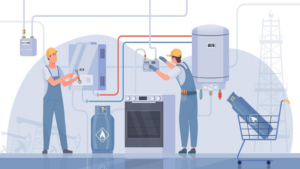A Complete Furnace Buying Guide
Are you considering buying a new furnace for your home? If so, our comprehensive furnace buyers guide will help you make an informed decision. In this guide, we’ll discuss how furnaces work, their lifespan, the different types available, how they add value to your home, factors that determine furnace efficiency, and government rebates in Canada.

How furnace works?
A furnace is a heating system that uses natural gas, propane, oil, or electricity to heat air, which is then distributed throughout your home. The process begins with the furnace drawing in cold air through return ducts. The air passes through the furnace filter, which removes dust and other particles to improve indoor air quality. The cleaned air is then heated by the heat exchanger, which transfers heat from the energy source (gas, oil, or electricity) to the air. Finally, the warm air is pushed by the blower motor through ducts and into your living space. If your home has an air conditioning system, the furnace works in tandem with it to move air flow and provide both heating and cooling.

How long do furnaces last?
The lifespan of a furnace depends on various factors, such as the temperature control the type of furnace, its maintenance, and usage. Typically, a well-maintained gas furnace can last 15-20 years, while oil furnaces may last 15-25 years, and electric furnaces can have a lifespan of 20-30 years. Regular furnace maintenance, including cleaning and replacing the furnace filter and scheduling annual tune-ups, can extend the life of your heating system.
What are the different types of furnaces?
There are several types of furnaces available, including natural gas furnaces, propane furnaces, oil furnaces, and electric furnaces. Each has its own advantages and disadvantages.
Natural Gas Furnace
These are the most common type of furnace in Canada due to the availability of natural gas. They are efficient and have lower operating costs compared to other types of furnaces. This kind of systems can convert 98% of the fuel into heat.
Propane Furnace
Propane furnaces are similar to the systems mentioned before but use propane as the fuel source. They are an option for homes without access to natural gas lines. A propane furnace can also be highly efficient, with AFUE ratings similar to those of natural gas furnaces.
Oil Furnace
These furnaces use heating oil as their fuel source. They are less efficient than gas furnaces, and their operating costs can be higher due to fluctuations in oil prices. However, they can still provide a reliable source of heat in areas without access to natural gas or propane.
Electric Furnace
An electric furnace use electricity to generate heat, making them an option for homes without access to natural gas or propane. They are generally less efficient than gas furnaces, but they can still provide reliable heat and have lower furnace installation costs.
Does a new furnace add value to your home?
Investing in a new furnace can increase the value of your home, as potential buyers are often attracted to energy-efficient homes with lower operating costs. Energy efficient furnaces, such as those with an Energy Star rating, are especially appealing. Additionally, a new furnace can improve air quality and overall comfort, making your home more desirable to prospective buyers.


What determines furnace efficiency
Is primarily determined by the annual fuel utilization efficiency (AFUE) rating, which measures the percentage of fuel converted into usable heat. Factors that contribute to a higher AFUE rating include:
- Variable Speed Blower Motors: This system adjust their speed based on your home’s heating needs, which can improve energy efficiency and maintain a more consistent temperature throughout your home.
- Heat Exchanger Design: A well-designed heat exchanger can transfer more heat from the fuel source to the air, resulting in a more efficient device.
- Type of Furnace: As mentioned earlier, natural gas furnaces and propane furnaces tend to be more energy efficient than oil furnaces and electric furnaces.
- Modulating or Staging: Some furnaces have modulating or staging features, allowing them to adjust their heat output based on the temperature outside and your home’s heating needs. This can lead to better energy efficiency and increased comfort.
- Proper Installation: Having your furnace installed by a professional ensures that it operates at peak efficiency, which can impact its overall performance.
How much does a new furnace cost?
The cost of a new furnace and heating equipment can vary widely depending on several factors, including the type of furnace, its efficiency rating, size, brand, and additional features. In this section, we will explore the factors that influence the furnace price and provide you with a better understanding of what to expect when buying a furnace for your home.
- Furnace Types: As previously mentioned, there are several types of furnaces available, including natural gas, propane, oil, and electric. Generally, gas furnaces tend to be more expensive upfront but offer lower operating costs. An electric furnace typically have a lower initial cost but higher operating costs.
- Furnace Efficiency: Energy Star rating furnaces, can save energy and reduce heating bills in the long run. However, they usually come with a higher upfront cost compared to less efficient models.
- Furnace Size: The furnace size, measured in BTUs (British Thermal Units), determines how much heated air the furnace can produce. Larger homes require more BTUs, which can increase the furnace price. It is essential to properly size your furnace to ensure efficient heating operation and avoid unnecessary energy consumption.
- Single Stage vs. Multi-Stage: Single stage furnaces operate at full capacity, providing a constant level of heat, while multi-stage furnaces can adjust their output depending on your home’s heating needs. Multi-stage furnaces tend to be more expensive but offer better energy efficiency and more consistent indoor temperatures.
- Furnace Brands: There are many furnace brands available in the market, with varying price ranges and reputations for quality and reliability. Researching and comparing different furnace brands can help you find a suitable option within your budget.
- Additional Features: Some furnaces come with advanced features, such as variable speed blower motors, advanced air filtration systems, or smart thermostats. These features can improve comfort and air quality but may increase the furnace price
Government Rebates
Canadian homeowners can take advantage of various government rebates and incentives when purchasing a new, energy-efficient furnace. These rebates are designed to encourage homeowners to invest in high efficiency furnaces and other energy-saving upgrades, ultimately reducing greenhouse gas emissions and energy consumption. Programs such as the Energy Star program and provincial rebate initiatives can help offset the cost of a new furnace, making it more affordable to invest in an efficient systems. Find out how you can qualify for up to $5,000 for installing energy efficiency upgrades.

Furnace Troubleshooting and Essential Maintenance Tips
Dealing with a malfunctioning furnace during the winter season can be both uncomfortable and costly. Before contacting a service technician about your hvac system, there are a few basic diagnostic steps you can try yourself.
Keep in mind that attempting to repair a furnace can pose significant risks and must be carried out exclusively by a skilled and licensed professional. We highly recommend seeking the expertise of a licensed HVAC technician for any maintenance or repair tasks.
The Furnace Won’t Start If your furnace isn’t turning on, make sure to:
- Verify that your thermostat is on and functioning correctly.
- Inspect the pilot light. If it needs to be relit, consult an expert.
- Examine your furnace switch.
- Review your circuit breaker at the electrical panel.
- Check your furnace filters and replace it if necessary.
Unusual Noises
If you hear loud noises or detect a gas smell, avoid operating any electrical devices. Leave your home immediately and contact your gas company. They will send an expert to assess the risk of a gas leak. Afterward, you can reach out to an HVAC expert for furnace repairs or replacement.
The Furnace Produces Excessive Noise
A common complaint from homeowners is the noise level of their furnace, especially when compared to their previous heating systems. One reason for the difference could be the type of fan motor. A single-stage furnace fan typically operates at a high setting and can be noisier than multi-stage or modulating furnaces. Other possible causes include an improperly sized furnace for your home or a clogged filter. Begin by changing your furnace filter, and if the noise continues, consult an expert for further assessment.
Inadequate Heat Output
If your home is not getting enough warmth, begin by examining the filters, making sure that return vents are free from obstructions, and verifying that no furniture is obstructing air vents or dampers. Verify that the thermostat is displaying the correct temperature by comparing it to another device. If you’re still experiencing issues after taking these steps, an HVAC professional can help identify the cause.
Frequent Furnace Shutdowns
A common reason for a furnace to shut down frequently is a dirty filter. If the issue persists after replacing the filter, it’s time to call a professional, as this could indicate a failing component within the furnace.
Routine Maintenance
Following the installation of a new furnace, it is crucial to have a licensed technician carry out quality inspections and clean all primary components every 1-2 years. This ensures that your heating system adheres to the manufacturer’s guidelines. Depending on your furnace’s efficiency, it is recommended to replace filters monthly or even less frequently. Numerous companies provide furnace protection plans, which encompass same-day service in case of breakdowns, unlimited service calls, coverage for parts and labor, and round-the-clock customer assistance.
We recommend scheduling a furnace inspection and maintenance during the summer months, before the weather cools down.
In conclusion, when buying a new furnace, it’s essential to consider the type of fuel, energy efficiency, and available government rebates. By choosing a high efficiency furnace that meets your home’s heating needs, you can enjoy lower energy bills, improved indoor air quality, and increased home value. Remember to schedule regular maintenance and replace your furnace filters to keep your heating system running efficiently and prolong its lifespan.
Related Posts

Furnace Maintenance Tips for the Winter
Prepare for winter—ensure your furnace is set with key maintenance tips: filter changes, thermostat inspections, and regular checks.

The First Things You Should Do When You Get a New Furnace
Considering a new furnace? Check ducts, replace filters, and plan maintenance to boost efficiency and extend its life with these tips.

Furnace Humidifier 101: Benefits, Considerations, and Tips
Discover furnace humidifiers: types, health/home benefits, installation, and costs for winter air moisture.


No Comments